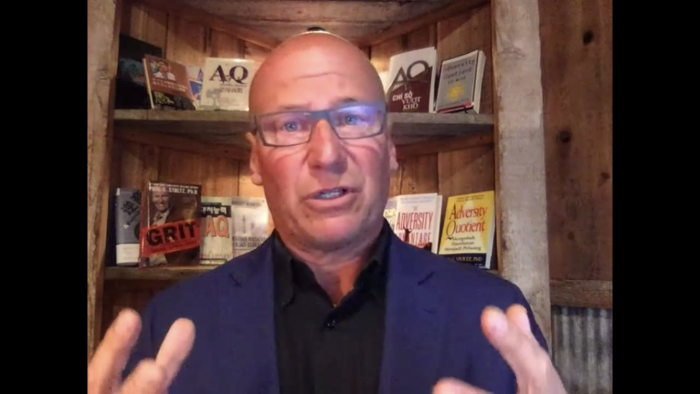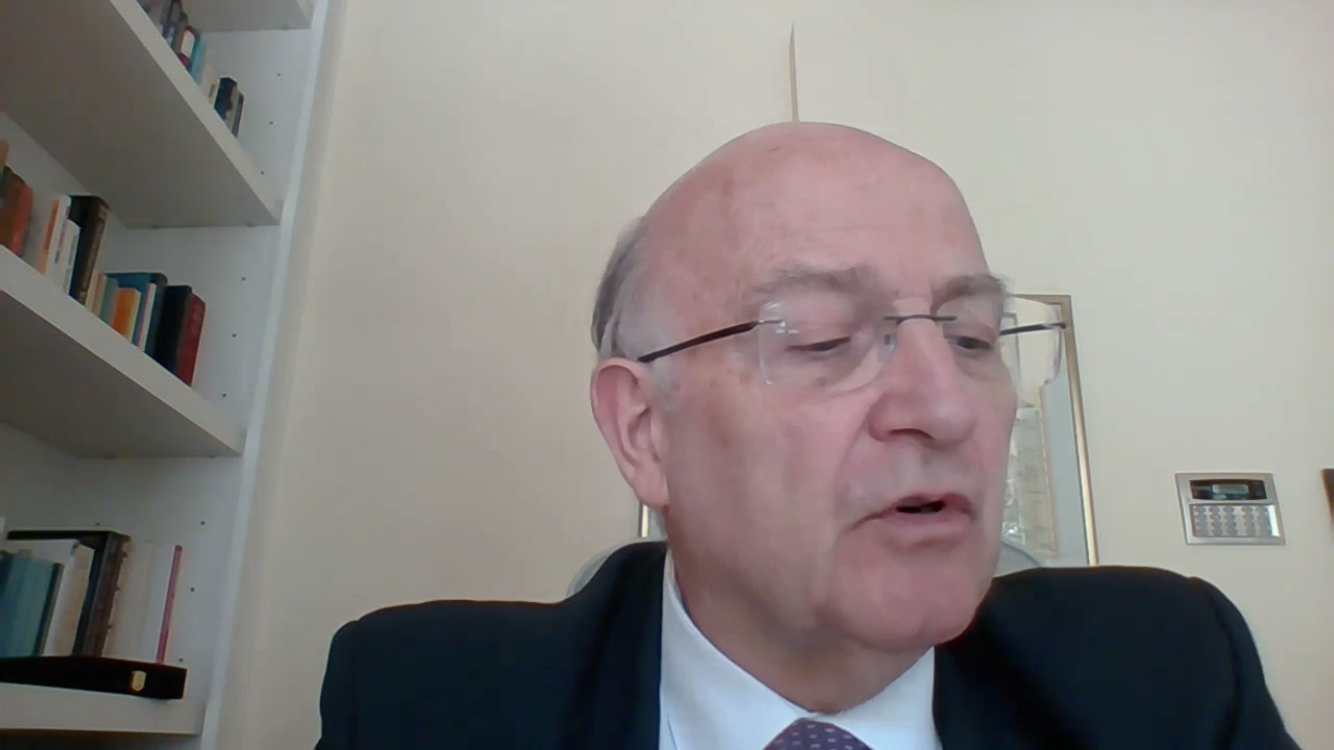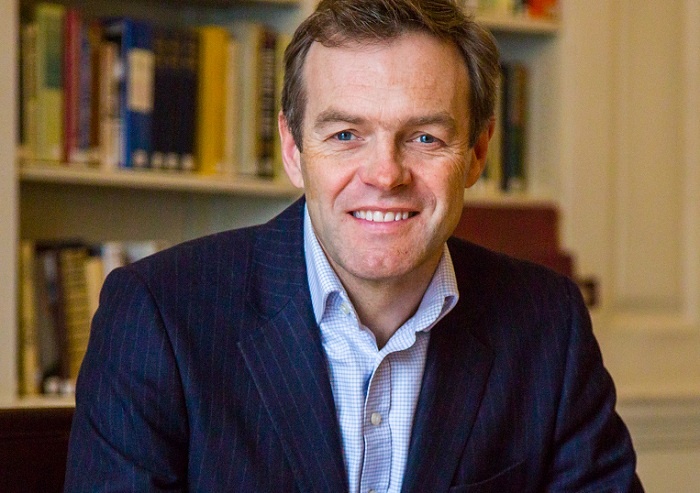
Breaking Travel News investigates: Hospitality Tomorrow
As many as 5,000 hospitality professionals have taken part in a new online show, Hospitality Tomorrow, to discuss the unprecedented situation created by the coronavirus outbreak.
While host Jonathan Worsley, chairman of organisers Bench Events, said it was “too soon” to begin contemplating recovery from the pandemic, he argued the industry must assess the scale, scope and impact of Covid-19 on the global economy. “It is crucial that we rebuild confidence,” explained Worsley. “Now is the time to start the conversation - make those critical connections that we need to build the right understanding, relationships, unity and actionable ways to support one another now for a stronger response - as one industry, one community.”
A host of leading experts gave their opinions during the day, many broadcasting from their own homes around the world.
Stoltz offered the keynote address during the inaugural Hospitality Tomorrow event
Paul Stoltz, chief executive of Peak Learning and a leading resilience analyst, offered the opening keynote address. Taking a counterintuitive approach, he explained: “I am excited for you guys in the hospitality industry – what if we can harness this adversity to create an experience for guests that is more brilliant than it has ever been before. Focusing on what you can control, minimising the downside, maximising the upside and creating something new.”
Expounding on his theory of the adversity quotient, he argued companies should grab this opportunity. “You can be the ones guests flock to in the new reality, with an intensified loyalty. Hotels can leverage this to create a new experience, one that is safer, better, more relaxed and enjoyable than even a guests’ own home. This is the 9/11 of the hotel industry, but it is an opportunity to harness your core strategy to come out the other side stronger than ever before. This is not the time ‘to cope’, ‘to manage’, but to harness the situation – in the future we can look back and thank this crisis for who we are, where we are and what we have become – this is a chance for a future more brilliant than we otherwise could have imagined.”
Capital Economics chairman Bootle was able to offer a global perspective on the pandemic
Roger Bootle, chairman of Capital Economics, a leading independent macroeconomic research firm, was asked to offer his thoughts on the future of the global economy. He opened on a mildly optimistic note: “While this is unprecedented, there is no body of evidence to draw on, there is every chance we will get a ‘v’ shaped recovery – a very fast pick-up once the worst is past. However, some countries will see falls in GDP of 20 per cent or more in a very short period, worse than the Great Depression in some cases.”
Bootle argued damage to the economy was caused by the lockdown, not the virus itself. With a limited loss of life, compared to a war, and no loss of capital stock, a potential recovery could start quickly, he added.
Examining the hospitality sector directly, he explained: “There is going to be damage to the balance sheets of many consumers in the short-term. But I anticipate, when restrictions are lifted, there is going to be a great surge in demand for hospitality. However, this might not be sustained for the year- or two-afterward, given the damage to personal finances – and this might lead to disappointment in the mid-term. In the longer term, memories of this episode will fade, and the prospects of this sector are extremely good. The evidence is, people will not be wanting more ‘things’, but they will want more ‘experiences’ – going out, travelling, all of which s going to be good for the sector in the medium-term. This torrent of strong medium-tern growth will override the short-term damage.”

Haitham Mattar, chief executive of BeyondTourism, led a breakout session featuring Extreme Group chief executive, Alistair Gosling, and Shannon Stowell, chief executive of Adventure Travel Association
In addition to events on the main stage, Hospitality Tomorrow offered breakout sessions featuring more top executives, covering the prospects for adventure travel, crisis management tips from around the world, the post-corona age, the role of hospitality in community resilience and how to capitalise on the downtime.
Other popular conference activities were also replicated online, including speed networking, which gave participants a chance to participate in a series of three-minute one-on-one video calls with other delegates.
There was also an on-line exhibition, where it was possible to browse through virtual exhibition booths and engage in a live video conversation with a representative of the exhibitor.
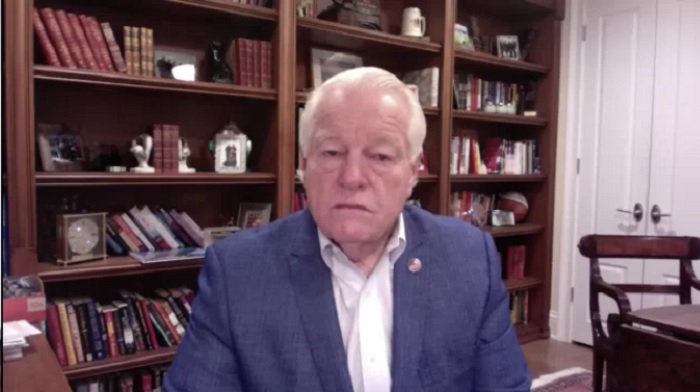
The central importance of tourism will become clearer following the coronavirus pandemic Dow told the audience
Roger Dow, chief executive of the United States Travel Association, said tourism would be a key part of the economic recovery. “The pandemic is disproportionately hitting the travel sector – with 60 per cent of the lost jobs in the United States coming in our industry. This experience will allow people to understand the link between travel and almost everything else we do.”
Dow pointed to the support offered by the American government as a positive step for tourism, with funds totally $300 billion on offer, and $50 billion going to US-based airlines alone.
“We must prepare for the recovery now, getting this money to people, helping them apply. The important thing is to be ready, not to be talking about recovery at the wrong time, but be ready to do something very big when the time is right – if we move too soon, we will come off as tone deaf,” he added. “When cases begin to go down, which they will, people still may be carrying a fear of the virus – we will need experts to go out and showcase the efforts that are being made to keep people safe. The recovery will come in waves, with domestic first, and then internationally – it will not come in one day.”
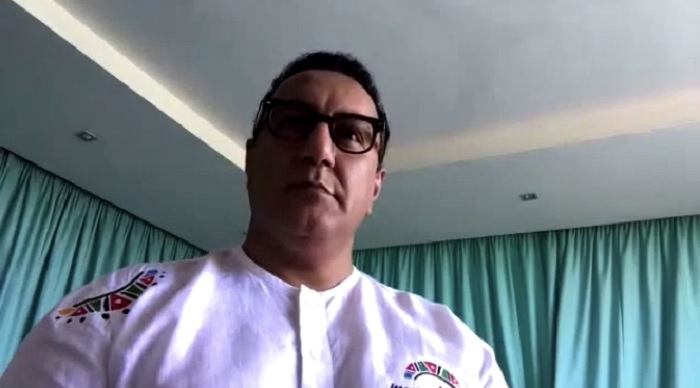
Kenya minister of tourism Balala argued this was an opportunity to overhaul the hospitality sector for the future
Taking a government perspective, Kenya minister of tourism, Najib Balala, argued relationships between the public and private sector would be vital.
He explained: “We cannot even know what is going to happen tomorrow – we are still focused on saving lives and stopping the spread of the coronavirus. It will take a long time for the country to stabilise and we can look at our post-corona strategy. Until November, we will have very little tourism in Kenya and Africa more generally. Airlines will be key to this – until we see frequencies returning to daily, we will not see tourism revived.”
He added: “Without airlines, without maritime support, the cruise ships, we will not recover. The United Nations World Tourism Organisation will be key to this, and has taken the lead, to offer some optimism. There will be a new normal soon, and we can correct mistakes in terms of climate change, overtourism and sustainability. Some of the operators that do survive this crisis will be immune, stronger than before, but some will not survive. We need to mitigate the damage and accentuate the positive for a new world order. These two- or three-months of lockdown will give us a chance to examine how we might do this.”

Jager outlined the devastating impact of the Covid-19 outbreak
Olivier Jager chief executive of analytics company ForwardKeys, gave digital delegates an overview of the impact of the Covid-19 outbreak on the aviation industry. He revealed global travel was down by an average of 40 per cent during the first quarter of the year, led by a near two thirds fall in China and smaller declines in Europe and North America. Total global hotel bookings stood at -80 per cent, meaning many more stays were being cancelled than were being made, over the first quarter of the year.
“The damage we have seen in Asia, which saw the impact of the coronavirus pandemic first, has been mirrored by Europe and North America later,” explained Jager. “There is little room for a rebound, as governments are too focused on closing borders and this will not change for a period. We have broken the chain of travel, and it will take time to get the planes back in the sky, and to get people booking again.”
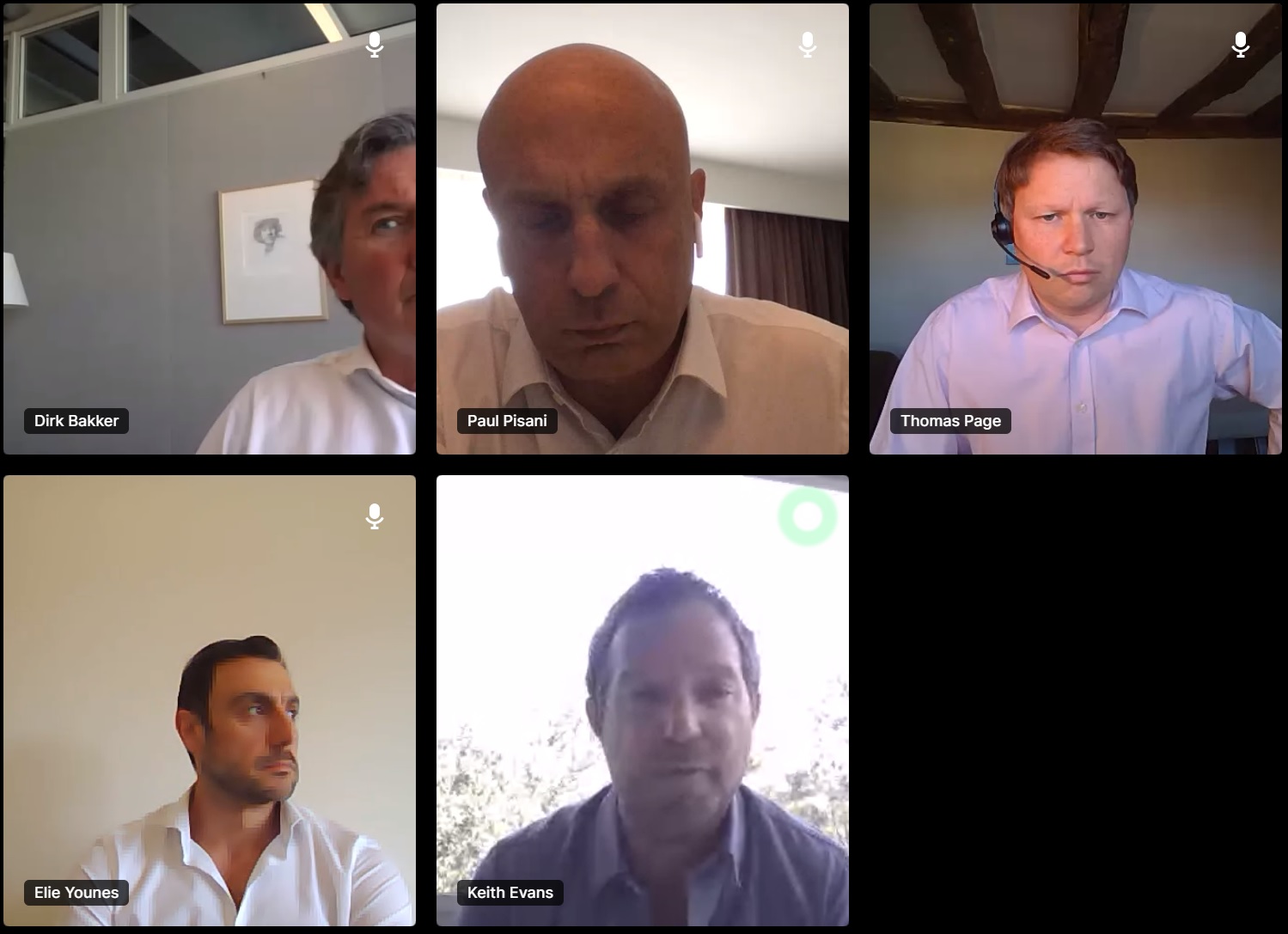
Younes wanred recovery could be a lengthy process
In a breakout session focused on the ‘post-corona world,’ Elie Younes, chief development officer with Radisson Hotel Group, warned recovery could take a significant period. Suggesting the short-term was focused on survival, he explained: “The lights are off, our hotels are closed – even the ones that are open, you can consider them closed, it is costing us more money to keep them open than it would have to close them. We are keeping an eye open for opportunities, but it is tough.”
Looking ahead, he added: “Our hotels in China, where we have 2,000 with our partners Jinjiang, are running at 30 per cent, but they are not making money. So, we have to ask ourselves when we should open the hotels, so they make money? In the last crisis, in 2008, it took six years to get back to the peak – markets like Frankfurt, Paris and others, took a long time. Those that relied on domestic travel recovered faster, and that was an ‘easier’ crisis than the one we are going through. We hope it takes less time around, but the recovery is much wider.”
On a positive note, Younes said: “One of the positives to come out of this will be a move from a fixed-cost structure to a variable cost-structure, we will also learn to be a little leaner in the way we run our hotels.”
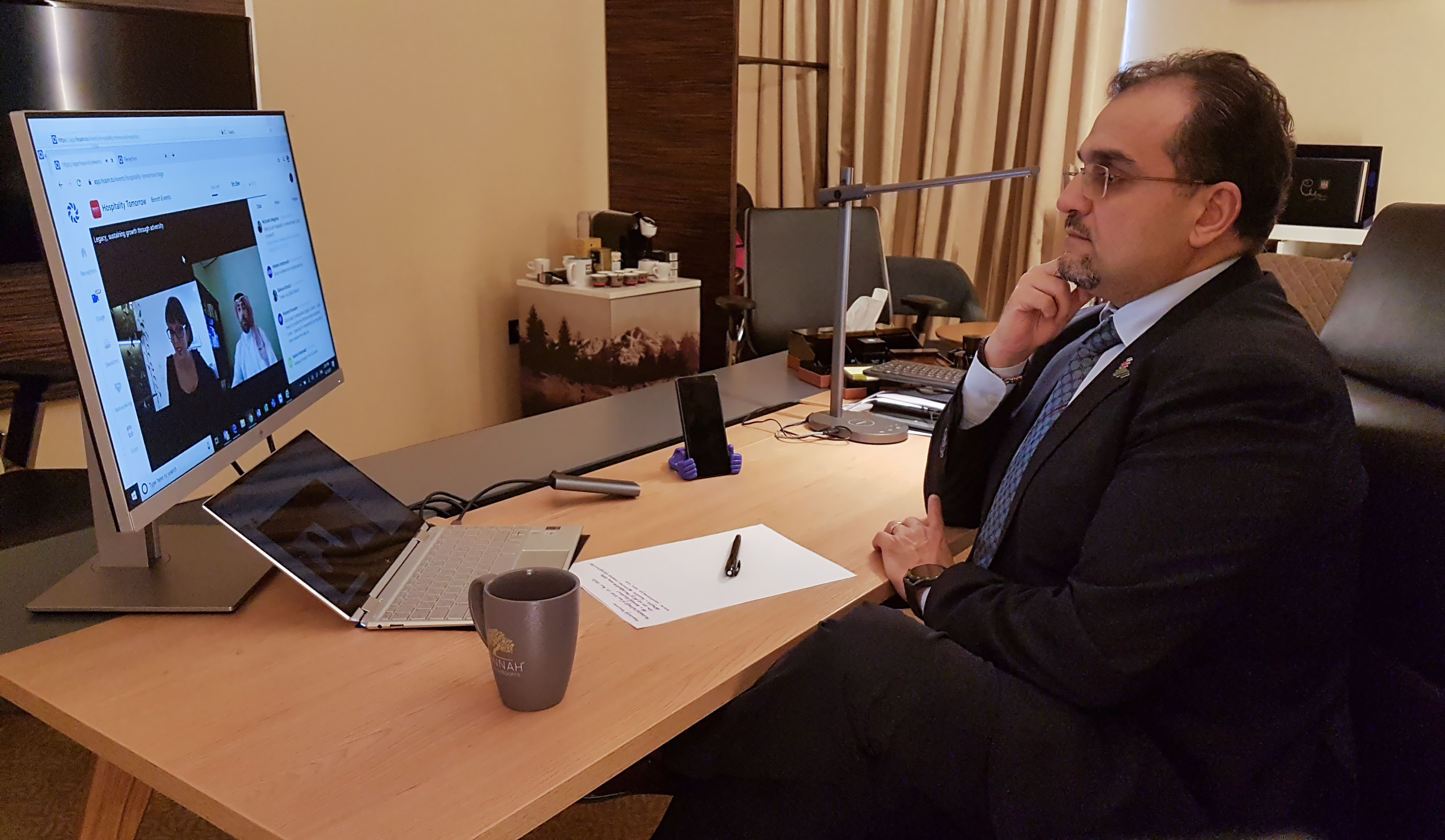
Haddad said solidarity would be vital to the recovery of the industry
Richard Haddad, chief executive of Jannah Hotels & Resorts, was one of the thousands of industry leaders tuning in. He said: “I would like to thank Bench Events for organising this global event which brought together a high-level line-up of speakers and panellists. The most important impact that I take out of this event is the positive spirit of the various players in the industry, as well as the potential recovery forecasts.”
He concluded: “On another note, at this critical time our industry is facing, joining hands and knowing that everyone is working globally towards the brighter ‘tomorrow’ is vital for the travel and tourism world.”
More Information
Hospitality Tomorrow is organised by the global event organiser Bench Events, which has a long track record of delivering multiple premium hotel investment conferences and forums across Europe, the Middle East, Africa, Asia and Latin America.
Find out more on the official website.


